Does Food Affect Heart Rate? Understanding Post-Meal Palpitations
In this comprehensive guide, we’re going to answer a question many readers have been asking: does food affect heart rate? We’re finding out what foods tend to cause post-meal palpitations and how you can avoid these irregular heart rhythms.

Do you find that your heart rate speeds up drastically after you’ve finished a meal? If so, you’re probably a little concerned, and rightfully so.
Experiencing an elevated heart rate after a meal is more common than you might think, and the reason behind it may come as a surprise.
Some foods contain ingredients and chemicals that may alter your blood sugar levels, cholesterol, and blood pressure. All of these things can cause your heart rate to change, which can lead to palpitations.
In this article, we’ll delve deeper into the cause of this phenomenon and help you understand why exactly it happens. We’ll also look at what foods you should avoid if you get post-meal palpitations and what foods can help with this condition.
Read on for more.
Does Food Affect the Heart Rate?
Eating does cause changes in our blood flow and blood pressure, which can cause an increased heart rate. If you overeat, your heart is forced to work harder than normal since you require more blood to move to your digestive system, causing an increase in heart rate.
However, if you are not an overeater, then it’s probably what you eat, and not how much you eat, that is the culprit behind your high blood pressure.
You’ve probably already heard about cutting down on high carbohydrate foods and processed sugars. In addition to causing weight gain and other health problems like heart disease, these two foods can cause heart palpitations in people who deal with hypoglycemia or low blood sugar.
Foods rich in sodium are also suggested to cause heart palpitations, as well as rich or spicy foods. Heart palpitations are also often accompanied by heartburn, so be sure to look out for heartburn the next time you are experiencing atrial fibrillation – it could reveal the food that’s causing it.
Heart Palpitation After Eating – Is It Common?
Palpitations can occur at any point, including during or after a meal. While they can certainly be scary, they are generally not causing concern and are not determiners of your cardiovascular health.
Heart palpitations are the feeling that your heart is pounding, racing, fluttering, or skipping a beat. You might notice an elevated heart rate when you are experiencing a palpitation, or you may feel as though your heart is beating in your neck, throat, or chest.
Experiencing heart palpitations after eating is quite common and is often the result of food sensitivities or allergies. Increased heart rate happens throughout the day for a variety of reasons, but we’re more likely to notice it when we are at rest or are not distracted.
You’ll often only notice a palpitation or irregular heart rhythm when sitting still, lying down, or resting. However, if you experience chest pain or trouble breathing and seeing alongside a rapid heart rate, you may need to see a doctor.
Foods and Drinks to Avoid if You Have Heart Palpitations
There are several foods known to cause heart palpitations. Here are some of the biggest culprits:
#1 High-carb foods
High carbohydrate foods are not just inhibitors of your weight loss progress. Foods high in carbohydrates can cause your blood sugar levels to spike, which causes your heart rate to increase.
This can lead to atrial fibrillation, which is more commonly known as heart palpitations. Carbohydrates are more likely to cause heart palpitations in people with low blood sugar, also called hypoglycemia. If you have hypoglycemia, try to eat as few high-carb foods as possible.
Some of the main high-carb culprits include cakes, sugary drinks, fried foods, and most fast foods.
#2 Caffeine and energy drinks
This next food probably goes without saying, but any food or drink with high levels of caffeine will cause you to experience an increased heart rate. This can quickly lead to uncomfortable palpitations and, if you’re not careful, could even result in more challenging cardiovascular health issues down the line.
If you already struggle with high blood pressure, chest pain, coronary artery disease, or heart palpitations, try to avoid food and drinks that are high in caffeine, including energy drinks. They will only serve to exacerbate your symptoms.
#3 Fat-rich foods
Interestingly, the health of your blood vessels also affects your heart rate. If your diet is high in trans and saturated fats, your LDL (or bad cholesterol) levels will be elevated, altering your cardiac activity.
Diets high in saturated fats also increase your risk of atherosclerosis, a condition that causes the arteries to harden and often results in chest pain. Plaque that forms on the inner lining of your blood vessels narrows them further, which means your heart has to work harder to maintain a stable blood flow.
Some common foods that are rich in fat include poultry skin, bacon, sausage, whole milk, cream, and butter.
Try to substitute saturated fats for healthy fats instead. Healthy fats are known to benefit cardiovascular health and will not have a negative impact on your blood flow.
#4 Alcohol
Not many people know that alcohol can also lead to heart complications. Heavy drinking can damage your heart cells and result in heart palpitations. It also negatively affects blood flow, which affects your heart rhythm.
There’s good news, however. If you stop drinking, your heart may return to normal, and you might not experience palpitations anymore. If having a glass of wine with dinner is part of your daily routine, and you aren’t experiencing any abnormal rhythms, then there’s no need to cut out alcohol.
#5 Foods that contain tyramine
Tyramine is an amino acid that can negatively affect your blood pressure and trigger heart palpitations. Try to stay away from foods that are high in this compound if you notice heart palpitations.
Soy sauce, aged cheese, sauerkraut, and salami are usually the leading culprits. While it’s not necessary to cut these foods out of your diet completely, you should try to eat them as seldom as possible if they are causing heart palpitations.
#6 Salty foods
Eating an excessive amount of sodium can cause your blood pressure to spike. Not only that, it can cause structural changes in your blood vessels and increase your risk of developing atrial fibrillation.
Foods such as soup, deli meats, pizza, and most fast foods are high in sodium and can trigger heart palpitations.
How to Stop Heart Palpitations After Eating? 4 Useful Tips to Try
If you notice heart palpitations regularly after eating, then there are a few things that you can do to remedy the issue and prevent them from occurring again.
#1 Eat a balanced diet
This likely goes without saying, but if food is causing your heart palpitations, then the best thing you can do is eat a balanced diet. This means getting a good balance of protein, dairy, carbs, and healthy fats to ensure your body is getting all the nutrients it needs.
As we’ve mentioned, try to avoid foods and drinks that are high in caffeine, as they will cause your heart rate to increase. High-carb foods can be eaten every now and then, but only in moderation, and you’ll want to ensure you aren’t eating too many.
Foods that are rich in saturated and trans fats can cause heart palpitations as well, so try to eat as little of those as possible. However, that’s not to say that you should stay away from fats altogether – healthy fats can positively impact your heart health and the rest of your body. Avocados are a great source of healthy fats, as is olive oil.
#2 Drink more water
You’ve probably heard this many times before, but drinking more water can offer a range of benefits to your body. It helps keep your organs hydrated, allowing them to operate at peak performance.
Furthermore, staying hydrated means you will rarely be at risk of dehydration. Your heart will never be without adequate hydration, and your digestive system will be able to process foods more effectively, as your stomach and bowels will always remain hydrated.
#3 Perform relaxation techniques
Stress can trigger or worsen your heart palpitations, as it tends to spike your body’s adrenaline levels. So, stress management through relaxation techniques, including tai chi, meditation, and yoga, can be a great help.
Try sitting cross-legged and taking slow breaths through the nostrils, then out through the mouth. Repeat until you feel like you are in a calmer state.
Additionally, try to focus on relaxing throughout your day rather than just when you are feeling a palpitation. Stop and take five deep breaths every 3 hours to calm your mind and stay relaxed.
Keeping your stress under control will help you avoid episodes of fast heartbeats and lower your resting heart rate over time.
#4 Consume electrolytes if needed
Electrolytes are chemicals that help move electrical signals throughout your body. These electrical signals are important for the functioning of your heart, so if you think that you may require more, here are some good electrolytes to consume:
- Magnesium
- Calcium
- Potassium
- Sodium (in moderation)
Some good potassium sources are bananas, spinach, avocados, and sweet potatoes. To increase your calcium intake, try to eat more dairy products and dark leafy greens (also a good magnesium source).
If you still need more, supplements can also help maintain your balance of electrolytes, though you should speak with your physician before taking any new supplements. It’s also important to remember that you can take too many electrolytes.
FAQs
Yes, sugar can cause heart palpitations. If you are struggling with heart palpitations, try to reduce your sugary food intake. Avoid things like candies, too much chocolate, sodas, and other foods high in sugar. You don’t have to cut these foods out completely; eating them in moderation should be enough to minimize your palpitations.
The increase in your heart rate after a large meal is significantly larger than after a small meal. Generally speaking, your heart rate should be back to normal just two hours after eating. If you eat a large meal, it will take longer to normalize again.
Heart palpitations can be one of the earliest signs of abnormal blood pressure levels. So yes, elevated blood pressure can cause you to experience heart palpitations. If you think your palpitations are due to increased blood pressure, be sure to speak with your physician regarding treatment.
Tips on How to Avoid Heart Palpitations After Eating
The best thing you can do to avoid experiencing heart palpitations after a meal is to improve your diet, though the effectiveness of this method will depend on the trigger.
Try to consume foods that are rich in potassium. That includes potatoes, avocadoes, spinach, and bananas. Cutting back on alcohol and instead drinking lots of water-based fluids helps.
To avoid low blood sugar, you should also eat regularly and consistently. That means trying your best to eat at the same time each day, though we understand that this is not always possible.
You should also try monitoring your caffeine intake and reducing the amount of sugar and salt you eat. This will help keep your heart rate within healthy levels, which subsequently can help you avoid experiencing heart palpitations.
Conclusion
So, does food affect heart rate? The short answer: yes. There are many foods that have the potential to change our heart rate due to their ingredients and chemical makeup. Eating as few of these foods as possible can help you avoid palpitations.
Heart palpitations can be difficult and uncomfortable to live with, but they do not have to make life impossible. In fact, with just a few changes to your diet and lifestyle, you can mitigate the number of palpitations you experience and even completely cut them out of your life for good.

















































 Select your language:
Select your language: 








